4 Bed Exercises That Flatten Your Lower Belly Faster Than Crunches After 60

After 60, your core isn’t just about appearance—it’s about how well you move through daily life. Many adults notice their midsection becoming more prominent, even if their weight hasn’t changed much. The culprit? Weakened deep core muscles, tight hips, and postural shifts that happen naturally with age. The good news is that you don’t need intense gym sessions or complicated equipment to rebuild a strong, flatter core. These four gentle bed exercises target exactly where you need it most, and they take just 10-12 minutes to transform your midsection and protect your back.
What’s Really Happening to Your Core After 60
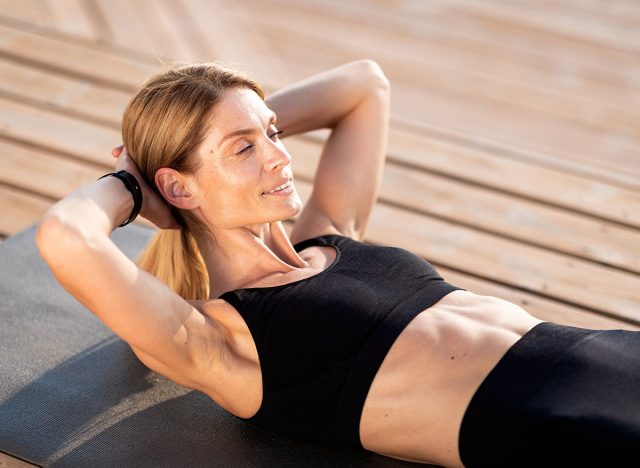
When I work with clients over 60, the same few issues come up time and again: weak deep core muscles, stiffness in the hips and lower back, and postural changes that make the belly area look more prominent. The lower abs and pelvic floor tend to lose strength with age, especially if you sit a lot or haven’t been training them directly. Add in tight hip flexors and limited mobility, and your core has a harder time firing properly—which not only affects how your midsection looks but also how your body moves and supports itself. The good news is your core muscles can absolutely be reactivated and strengthened at any age with the right approach.
Why Bed Exercises Are Perfect for Your Core
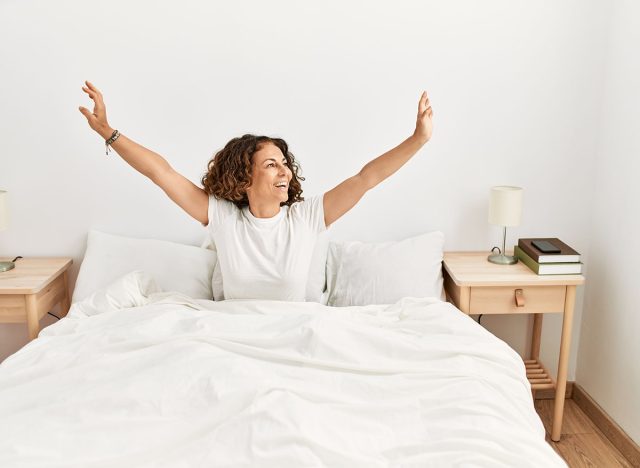
Bed exercises are a game-changer for older adults because they’re both gentle and effective. The soft surface supports your spine and joints, so you can focus on engaging your core without putting pressure on your lower back or hips. You’re able to move through smaller, more controlled ranges of motion, which builds real muscle control in the lower abs—an area most people struggle to target safely after 60. Bed-based moves also make it easier to relax your neck and shoulders, so all your effort goes where it should: towards deepening your core.
The 4 Best Bed Exercises for a Flatter, Stronger Core
Pelvic Tilt Press
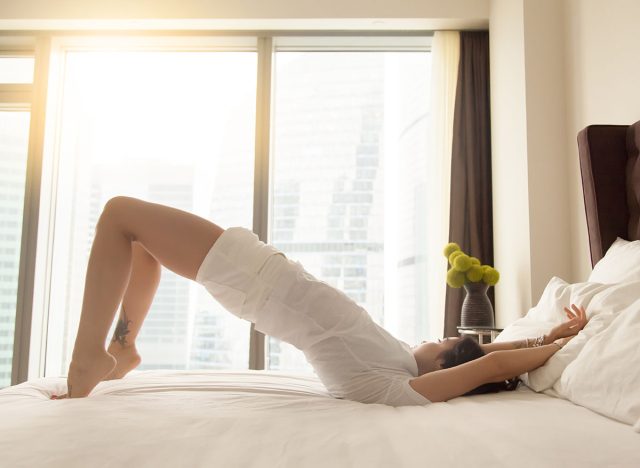
Why it works: Strengthens the deep core and pelvic floor, which helps pull in and flatten the lower belly.
How to do it:
- Lie on your back with knees bent and feet flat
- Exhale as you gently tilt your pelvis, so your lower back presses into the bed
- Hold for two seconds, then release
Sets/Reps: 3 sets of 15 reps, slow and controlled (2 seconds up, 2 seconds down)
Easier option: Place your hands under your hips for added support
Harder option: Hold the tilt and lift one foot a few inches off the bed
Common mistake: Don’t arch your back, keep the motion small and focused
Heel Slides
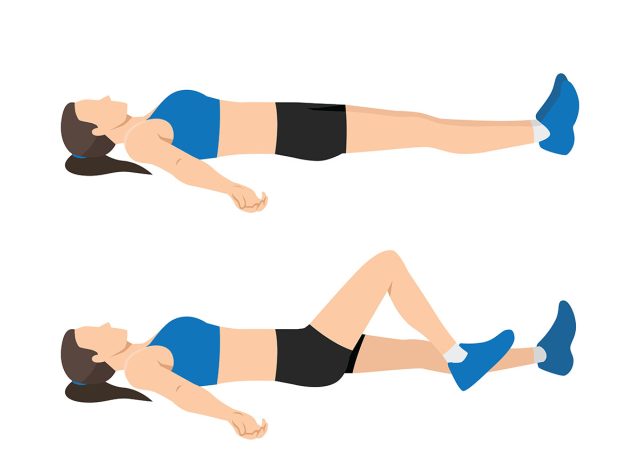
Why it works: Trains the lower abs while improving hip mobility without stressing the joints.
How to do it:
- Lie with knees bent and feet flat
- Brace your core and slide one heel along the bed until your leg is almost straight, then return to start
- Alternate legs
Sets/Reps: 3 sets of 12 per side, resting 30 seconds between sets
Easier option: Slide halfway out
Harder option: Hover your heel slightly above the bed as you extend
Common mistake: Don’t let your back arch or ribs lift off the ground, keeping your abs braced the entire time
Bent-Knee Leg Lifts
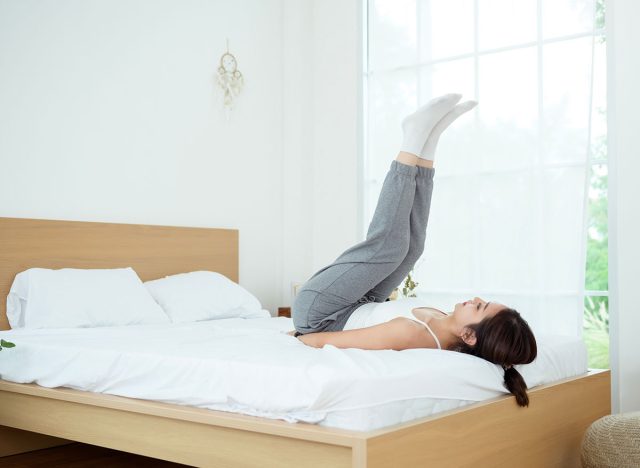
Why it works: Targets the lower abdominals while improving control through the hips and pelvis.
How to do it:
- Lie on your back, knees bent at 90 degrees
- Exhale and lift your knees slightly toward your chest, then lower slowly
Sets/Reps: 3 sets of 10-12, resting 45 seconds between sets
Easier option: Lift one leg at a time
Harder option: Extend both legs straight for a reverse crunch
Common mistake: Avoid swinging your legs, make sure to keep it slow and controlled
Side-Lying Oblique Crunch
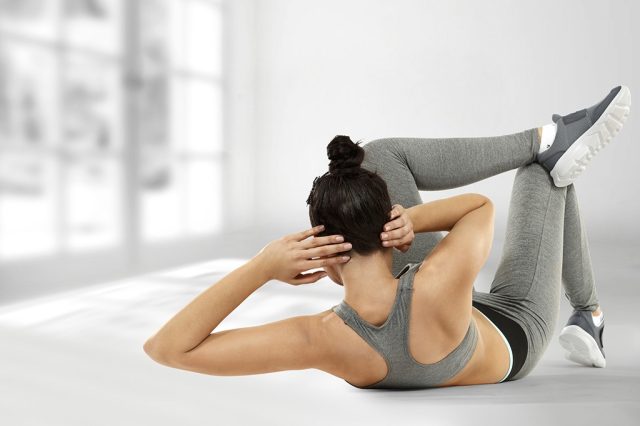
Why it works: Strengthens the obliques to tighten the waistline and support better posture.
How to do it:
- Lie on your right side with knees bent
- Place your left hand behind your head and exhale as you lift your shoulder toward your hip
- Lower with control, then switch sides
Sets/Reps: 2-3 sets of 12-15 per side
Easier option: Keep both hands in front of you for balance
Harder option: Straighten your top leg and lift it slightly as you crunch
Common mistake: Don’t pull on your neck—focus on your side body doing the work
What You Can Expect in 4-6 Weeks
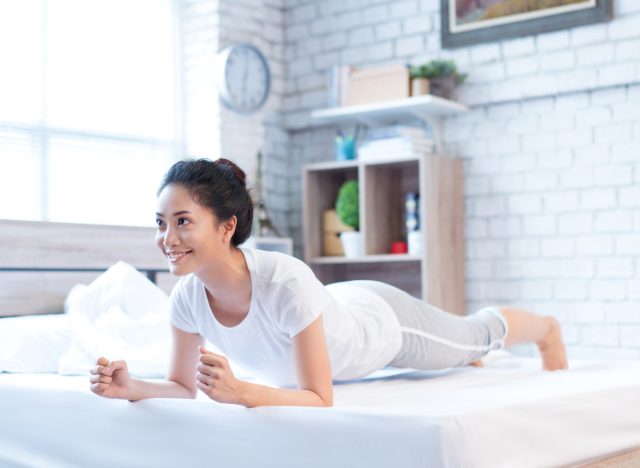
You don’t need to overcomplicate this. Perform these four moves as a circuit, resting about 15-20 seconds between exercises. The full routine takes roughly 10-12 minutes and can be done right in bed before getting up or even before sleep. Aim to complete this workout 4-5 days a week. Over time, as you feel stronger, add a second round or increase the tempo slightly to challenge your endurance.
If you stay consistent, you’ll start noticing changes within the first month. Expect a firmer, more stable core, improved posture, and less tightness through your hips and lower back. You might not see drastic visual changes right away, but you’ll feel the difference in your balance and strength. To track progress, measure your waist once a week or take a before and after photo from the side. Most importantly, notice functional improvements: if getting out of bed or standing tall feels easier, that’s real progress.
What If You Can’t Use a Bed?
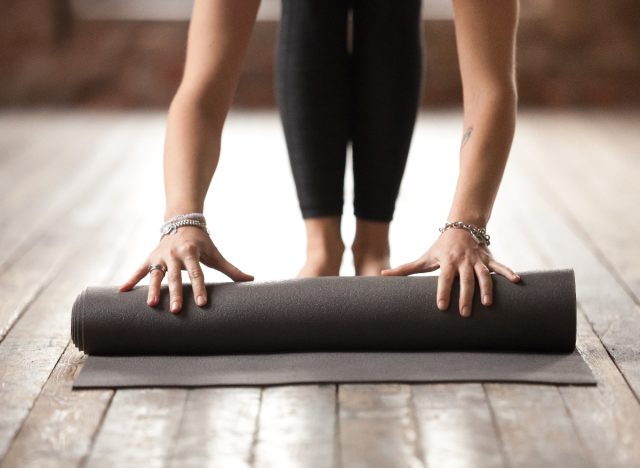
If you deal with low-back pain, focus on smaller movements and keep your breathing slow and controlled. Never push through pain—mild muscle fatigue is fine, but sharp discomfort isn’t. For anyone with joint replacements or arthritis, clear any new routine with your doctor or physical therapist first, and use the easiest variations until your body adapts. The goal here is consistency and control, not intensity.
If your bed is too soft or high, a yoga mat on the floor works well. Add a small towel or pillow under your lower back for cushioning and perform the same exercises. The goal is to have enough support so your spine stays comfortable, and you can focus on precise, controlled movement.
You don’t need crunches or complicated gym equipment to tighten your core after 60. A few minutes of smart, gentle, bed-based movement each day can build strength, protect your back, and help flatten your belly safely. Consistency beats intensity—so stick with it, and you’ll be amazed at how your body responds.